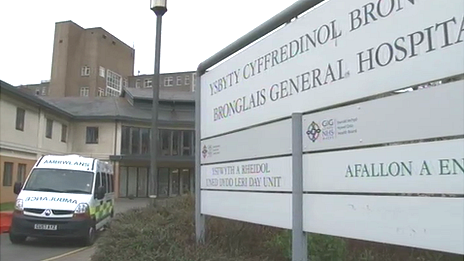Welsh NHS orthopaedic surgery demand a 'challenge'
- Published
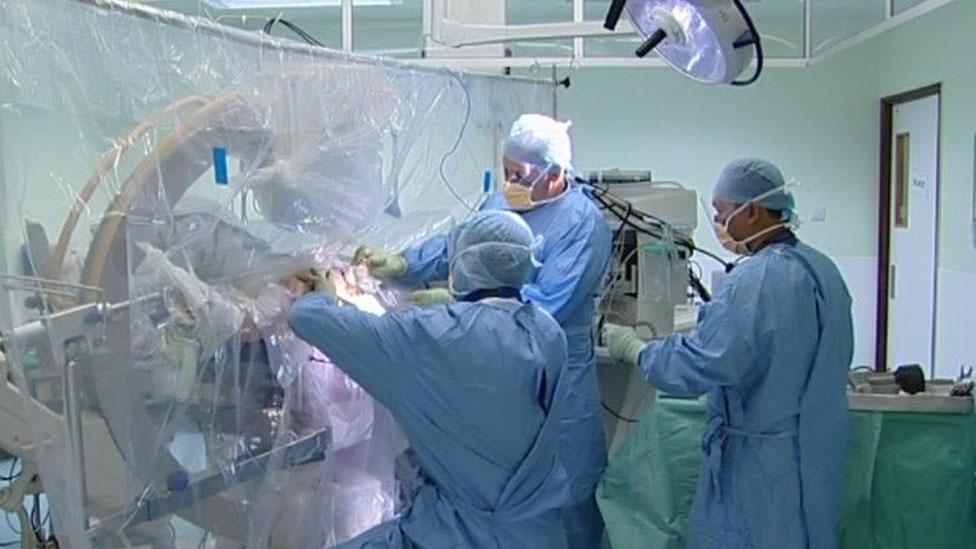
The NHS in Wales will not be able to keep up with demand for orthopaedic surgery unless there are big and urgent changes in the way services are run, the deputy health minister has warned.
Vaughan Gething AM has unveiled a plan, which he claims will deliver better care for people with bone, joint and muscle conditions., external
He said more patients are already being treated, with better results.
But opposition parties have condemned worsening waiting times.
Mr Gething admitted too many patients were waiting longer than they should for operations but the new plan would meet future demands.
"Over the last 10 years we've seen an improvement in the orthopaedic service in Wales," he told BBC Wales.
Gwynfor Thomas, from Brynamman, said he was told he had to lose weight to have surgery
"The challenge though is if we don't change the way we run the service right across Wales then we're unlikely to be able to meet that demand in the future.
"We treat more people than ever before, with more successful outcomes than ever before, but the challenge is - are we able to keep up with demand with the current way we do business? And we can't."

WAITING LISTS
More than 40,000 routine orthopaedic operations take place in Wales every year.
But the number of people waiting more than six months for treatment has been increasing since the summer of 2012.
Under Welsh government targets, 95% of patients needing planned treatment - including orthopaedics - should be treated within six months and nobody should wait longer than 36 weeks.
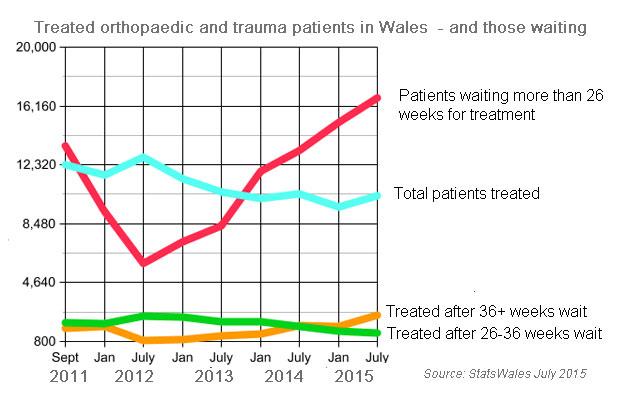
Over the last four years, the number of operations taking place has slowly reduced which the plan said has had a "significant" impact on waiting times.
Ministers blame a rise in medical and emergency admissions in recent years.
Deputy health minister Vaughan Gething says there has been a big rise in demand for orthopaedics in the last decade
This has been especially acute in the winter.
So the orthopaedic plan talks not only of the need "to change the service model for orthopaedics" but also of an urgent requirement "to improve capacity".
However, there is no mention of allocating any additional money or resources.
Indeed the Welsh government said this is a plan about changing the NHS works - not spending more money.

Tony David and his wife Beverley describe their frustration at the wait
A 17-MONTH WAIT
Tony David, 72, a retired engineer from Bridgend, has had one knee operated on and is waiting for surgery on the other one.
"It was in May last year when I saw the consultant and I asked him how long do you think it will be? He told me over 12 months.
"I've just come out [of hospital] now, so that's nearly 17 months."
His wife Beverley said it had been a frustrating time, with her husband left in pain.
Abertawe Bro Morgannwg health board said in a letter to the Welsh Liberal Democrats that the maximum orthopaedic waiting list at Princess of Wales Hospital in Bridgend had grown to 70 weeks due to "winter pressures".
The average waiting time is 38 weeks.
A spokeswoman said: "Our waiting times are longer than we would like and we are doing everything possible to reduce these times.
"Plans are in place to invest significantly in the service to increase the number of operations we are able to carry out.
"We are also continuing to look at options outside of the hospital."

MEETING A RISING DEMAND
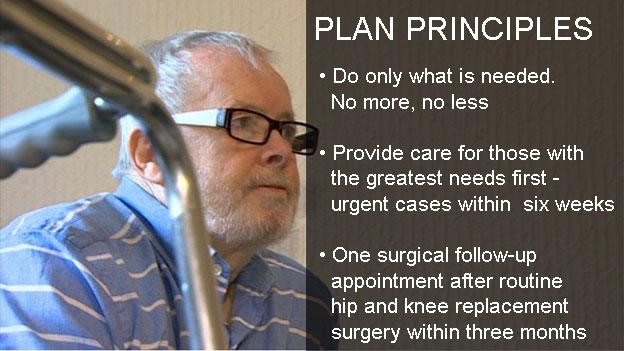
More of us are being referred to orthopaedic consultants by our GPs. The increase has been 30% since 2005.
This has been put down to Wales' ageing population, increasing obesity and medical advances.
One part of the plan will encourage orthopaedic patients who are very overweight or smoke to undergo smoking cessation or weigh reduction programmes before surgery.
Health boards will be asked to monitor compliance rates.
There has been sound evidence that this approach can lead to significantly better results after surgery, the Welsh government insisted.
In some cases, patients have found their conditions have improved enough so they no longer need surgery
Mr Gething insisted the courses will not be compulsory and that patients will not be penalised in any way for not losing weight or failing to stop smoking.
"Anybody who's clinically fit to have an operation can have that operation as and when it's needed," he said.
Conservative Shadow Health Minister Darren Millar AM said he was concerned the plan was a "smokescreen" for a failure to get a grip on spiralling delays for treatment.
"The figures speak for themselves; thousands of orthopaedic patients are left languishing on waiting lists in Wales and average waits for operations are around 300 days - almost twice as long here as they are in other parts of the UK," he said.
- Published7 October 2015
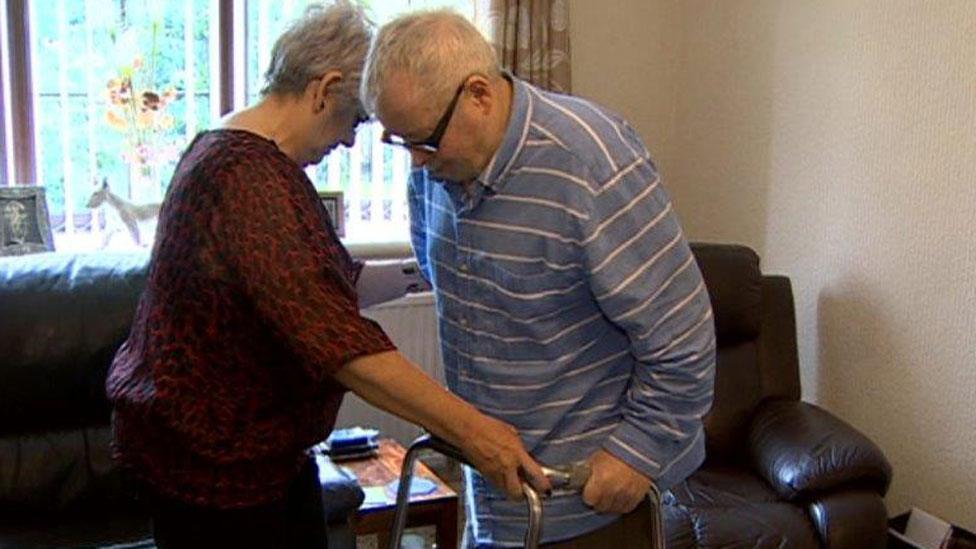
- Published12 February 2015
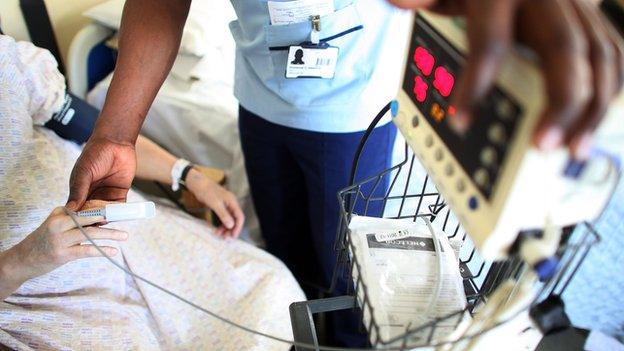
- Published27 January 2015

- Published12 February 2015

- Published21 October 2013
